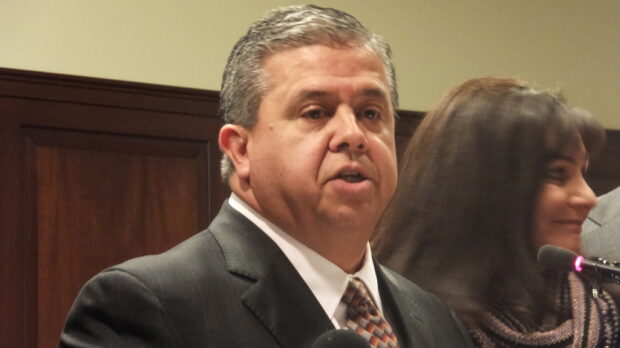Tom Luna got his political start as a Nampa school board member. In 2001, he was re-elected to a third term in a typically under-the-radar trustee’s race, by a 99-89 tally.
Two decades later, the state Republican Party chairman takes a slightly different view of trustees’ races. Luna sees them as a way for the state’s prevailing political party to reinforce its brand.
“We have many strong conservative Republicans running in these ‘non-partisan’ races,” Luna wrote in a recent guest opinion on school board and municipal elections. “They need and deserve your support and vote.”

Elections reflect the tone of their time. With trustees across Idaho facing uncommon scrutiny — partly because of local pandemic protocols, but partly because of the national blowback over critical race theory — this fall’s school board elections are shaping up to be much more politicized than the low-profile, low-turnout races of years past.
Where there are races, at least.
As Idaho Education News’ Blake Jones and Randy Schrader reported last week, 185 of Idaho’s 263 school trustee races will be settled by default, because only one candidate filed for office.
However, there is an uptick in interest. Forty-eight of Idaho’s 115 school districts will have at least one contested trustee’s race on Nov. 2, up from 40 districts two years ago. Nearly 30 percent of trustees’ races will be contested, up from 23 percent last election cycle. (Click here for a statewide list of contested races.)
Two of these contested races, in the state’s largest school district, have a pricey and partisan feel.
In one open race in the West Ada district, Lori Frasure has raised close to $20,700. Her opponent, Brent Hart, has slightly more than $1,300. In the second open race, Angie Redford has raised $11,600 (including $1,000 from Frasure); Anita Beckman has raised about $700.
A five-figure campaign war chest buys plenty of yard signs, and it’s hard to drive the suburban sprawl of West Ada these days without seeing them. But these are some uncommonly costly races. In November 2019, challenger Amy Johnson spent $5,600 to win a contested West Ada trustee’s race, ousting longtime incumbent Mike Vuittonet, who raised less than $1,200, from a single donor.
The funding sources are noteworthy as well. Frasure and Redford have collected $1,000 apiece from Travis Hawkes, a prominent local businessman who has frequently criticized West Ada administrators’ response to the pandemic. Redford has received contributions from three GOP legislators: Reps. Joe Palmer of Meridian and Codi Galloway of Boise, and Sen. Jim Rice of Caldwell.
Not surprisingly, even in nonpartisan trustee elections, both Frasure and Redford have played to conservatives.
“With the overwhelming support, it is clear the public wants a new conservative voice on the West Ada School Board,” the Frasure campaign said in a recent news release touting the fundraising numbers.

There’s certainly nothing unprecedented about partisan elected officials supporting nonpartisan candidates. When Alicia Estey won a Boise School Board race in 2018, she raised much of her $2,300 from Boise Democratic donors: former gubernatorial candidate A J Balukoff; Boise City Council member Holli Woodings; state Sens. Melissa Wintrow and Janie Ward-Engelking. Two years earlier, Beth Oppenheimer played to a similar base, raising close to $5,500 and winning a Boise trustee’s seat.
What’s happening in West Ada this fall isn’t new. But it comes as conservatives nationwide — mobilized over CRT and COVID-19 — appear to be focusing on school board elections and trustee recalls. To some, the school board backlash echoes 2010, and the Tea Party movement that helped Republicans flip the U.S. House, the Associated Press reported recently.
After spending much of the calendar year railing about CRT and COVID-19 protocols, the Idaho Freedom Foundation launched a survey of school board candidates. The response is sketchy; as of Thursday, the group has posted only 29 responses, representing a small fraction of the 179 candidates running in contested races. And the questions have a decided ideological slant. Voters can learn where a candidate stands on CRT, mask mandates or transgender bathrooms, but nothing about teacher retention, college and career readiness or reversing learning loss.
In other words, there isn’t much insight about the nuts-and-bolts work performed by trustees who make curriculum and textbook decisions, hire superintendents, and negotiate with local teachers’ unions.
But again, elections reflect their time. And at this time, many trustees are standing under a glare they probably couldn’t have imagined when they first ran for an unpaid school board position. In West Ada, Johnson is facing the threat of a possible recall election, as critics say the Blue Cross of Idaho employee should not vote on any district pandemic policies. In Boise, Estey resigned midterm last week, saying she could no longer juggle the demands of the trustee’s position with her administrator’s job at Boise State University.
“For many people these jobs are just not super-desirable at this moment,” said Jaci Kettler, a political science professor at Boise State.
This year’s trustee elections — just the second round of November board races, the result of a 2018 state law — could be a one-off. They could prove to be a blip, reflecting anger over a global pandemic and education culture wars.
Or they could prove to be part of a more complicated trend. A trend toward increased voter interest, higher turnout — and, said Kettler, elections more likely to be decided by casual voters who might take their cues from ideological groups.
If so, the school board elections of Tom Luna’s political infancy would be rendered a quaint relic.
Each week, Kevin Richert writes an analysis on education policy and education politics. Look for his stories each Thursday.
